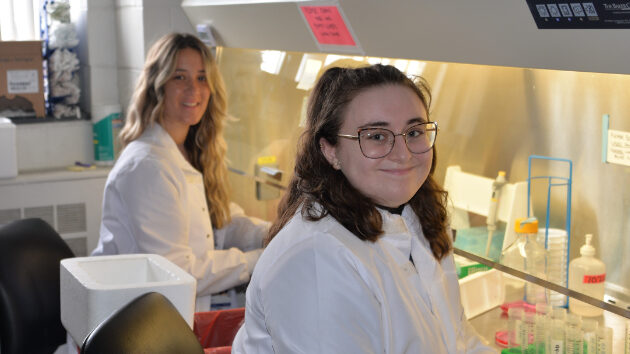Improving Heart Care Begins in the Lab

Pioneering Studies to Identify New Therapies
At Albany Medical College, scientists are studying diseases like heart failure and atherosclerosis at the molecular level, with the goal of identifying innovative new ways to treat them.
In the Department of Molecular and Cellular Physiology (MCP), a team led by Professor Yun-Min Zheng, MD and Professor Yong-Xiao Wang, MD, PhD, is researching how the molecule ryanodine receptor type 1 (RyR1) regulates cardiac function, and its impact on heart failure and hypertrophic cardiomyopathy.
Heart failure is a chronic condition that occurs when the heart can’t pump blood as well as it should. Hypertrophic cardiomyopathy causes the heart muscle to thicken, which can lead to heart failure.
They hope to show that drugs already used to treat other conditions could be effective for these diseases as well.
A multi-departmental team is also studying the connection between older immune systems, inflammation, and the progression of atherosclerosis.
Also called hardening of the arteries, atherosclerosis is caused when plaque builds up in the arteries. It underpins several cardiovascular diseases, which are collectively the leading cause of death in the U.S. and worldwide.
Gabrielle Fredman, PhD, professor in MCP, and Kate MacNamara, PhD, professor in the Department of Immunology and Microbial Disease, and their lab teams hope to reveal new ways to rejuvenate older immune systems which could, in turn, help slow or combat the progression of atherosclerosis.
“Aging is a major risk factor for atherosclerotic cardiovascular disease,” said Dr. Fredman, who also noted that the mechanisms of how aging impacts atherosclerosis have been underexplored. “Understanding the relationship between the immune system, non-resolving inflammation, and atherosclerosis is a key first step toward developing new treatments for this disease,” said Dr. Fredman.
Both studies are funded by new multi-million-dollar grants from the National Institutes of Health’s National Heart, Lung, and Blood Institute.
Ongoing studies at Albany Medical College also include research on why circadian rhythm disruption increases rates of heart disease and diabetes, persistent inflammation in atherosclerosis, and the chemistry of nitric oxide in the cardiovascular system.
Clinical Collaborations Increase Access
Across the Albany Med Health System, physicians are working together more than ever to quickly and securely share information that raises the level of patient care. A new Systemwide electronic medical record, scheduled to go online in 2024, will support these efforts even more.
One of the longest standing partnerships began in 2017, when Albany Medical Center and Columbia Memorial Health (CMH) formally and fully integrated their cardiology services.
Since then, specialists and subspecialists on the cardiology teams at each hospital have been collaborating to share resources and technologies.
One clear benefit to patients is increased access to experts in their field who can provide comprehensive care for cardiovascular diseases.
“A patient who enters any point in the Albany Med Health System should and will receive the highest standard of care,” said Edward Philbin, MD, chair of the Department of Medicine at Albany Medical Center, who first started seeing patients with complex heart problems at CMH in 2012. Today, he’s one of several cardiologists who sees patients at both the Albany and Hudson campuses.
Meeting the Needs of Our Community
At the core of the formation of the Albany Med Health System is a commitment to improving health through our three pillars – patient care, education, and research.
From the diagnosis and treatment of cardiovascular diseases among our neighbors, families, and colleagues to the groundbreaking research being conducted at Albany Medical College, and the training of future clinicians receiving a world-class medical education, the positive impacts of the System on patient health are clear.
“Ultimately, our overarching goal is to deliver as much care locally as we can,” added Dr. Philbin.